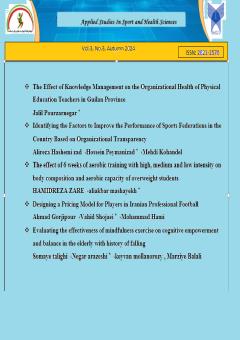The Effect of Knowledge Management on the Organizational Health of Physical Education Teachers in Guilan Province
Subject Areas : Management and health
1 - PhD. in Sport Managament, University of Tehran, Iran
Keywords: Physical Education Secretary, Organizational Health, Employee, Knowledge Management, Sports, Guilan Province,
Abstract :
The aim of this study is to investigate the effect of knowledge management on the organizational health of physical education teachers in Guilan Province. The research method employed in this study is a descriptive survey. The statistical population consists of physical education teachers working in art schools located in Guilan Province. The sample size consisted of 92 participants selected through cluster sampling, as determined by the Morgan table. The data collection instrument was a researcher-developed questionnaire, which had its face and content validity confirmed by 10 experts in the field. The reliability coefficient of the questionnaire was found to be 0.80, as measured by Cronbach's alpha. The research data were analyzed using the mean statistical method and the Pearson correlation coefficient, employing SPSS version 21 software. The results of the research indicate that all components of knowledge management—namely, knowledge identification (p=0.001, t=1.772), knowledge creation (p=0.001, t=2.365), knowledge recording (p=0.001, t=1.870), knowledge sharing (p=0.001, t=1.978), knowledge implementation (p=0.001, t=2.177), learning (p=0.001, t=2.419), empowerment (p=0.001, t=2.225), innovation (p=0.001, t=1.810), and productivity (p=0.001, t=2.622)—have a significant impact on the organizational health of physical education teachers in Guilan Province. Furthermore, there is a positive and significant relationship among all these components.
ابراهیمی میمند، منصور (1392). بررسی تأثیر مدیریت زمان بر عملکرد شغلی کارکنان بخش بیمهای سازمان تأمین اجتماعی استان کرمان. پایاننامه کارشناسی ارشد. دانشگاه آزاد اسلامی واحد سیرجان.
احمدوند، علیمحمد؛ موحدی، مسعود؛ قاضیزاده فرد، سید ضیاءالدین؛ محمدپور، ستار (1396). طراحی نظام مدیریت دانش سازمانهای بزرگ سلامتمحور. پژوهشهای پرستاری ایران، شماره 4، ص 76-81.
احمدی، علی اکبر؛ صالحی، علی (1389). مدیریت دانش. دانشگاه پیام نور.
پورزرنگار، جلیل (1401). ارتباط سلامت سازمانی و عملکرد شغلی دبیران تربیتبدنی هنرستانهای شهر رشت. در: اولین همایش ملی مدیریت ورزشی با رویکرد سلامت سازمانی، دانشگاه محقق اردبیلی.
جلوداری ممقانی، بهرام (1395). مدیریت دانش: فرایندها، ابزارها و تکنیکهای استقرار. انتشارات مرکز آموزش و تحقیقات صنعتی ایران.
خالصی، نادر؛ شمس، لیدا؛ یگانه، سمیه؛ جعفری پویان، ابراهیم؛ نصیری، طه؛ روستایی، نرگس؛ مرادی، طیبه (1391). ارتباط سلامت سازمانی با رفتار شهروندی سازمانی در بیمارستانهای دانشگاه علوم پزشکی تهران. پیاورد سلامت، 6(6)، ص 412-422.
سجادی، سید نصراله (1395). مدیریت سازمانهای ورزشی. تهران: سازمان مطالعه و تدوین کتب علوم انسانی دانشگاهها؛ مرکز تحقیق و توسعه علوم انسانی.
سلیمانی، نادر (1389). بررسی میزان سلامت سازمانی مدارس شهرستانهای استان تهران براساس الگوی هوی و فیلدمن. رهیافتی نو در مدیریت آموزشی، 1(4)، ص 23-43.
سلیمی، مهدی؛ نصیریخوزانی، مهدی؛ نظریان، علی (1402). اثر مدیریت دانش بر توانمندسازی و خودکارآمدی معلمان تربیت بدنی، نقش میانجی جوّ اخلاقی. تربیت بدنی و علوم ورزشی، شماره 4، ص 11-29.
قاسمی، حمید و همکاران (1400). مرجع پژوهش. تهران: انتشارات اندیشه آرا، چاپ دوم.
قرونه، داوود؛ ملکینیا، عماد (1394). ادراک معلمان از وضعیت سلامت سازمانی مدارس. رهیافتی نو در مدیریت آموزشی، 6(3)، ص 111-126.
قهرمانی، محمد؛ ابوالقاسمی، محمود؛ عارفی، محبوبه؛ خاتمی، میرحمید (1391). ارزیابی سلامت سازمانی دانشکدههای دانشگاه شهید بهشتی. مشاوره شغلی و سازمانی، 4(10).
محمودی، حامد؛ محسنی معلمکلائی، نجمه (1401). بررسی عوامل مدیریت دانش بر سلامت سازمان در ابعاد مختلف. در: پنجمین کنفرانس بینالمللی مطالعات بینرشتهای در مدیریت و مهندسی.
Abdulwahab, S.B. (2016). The relationship between job satisfaction, job performance and employee engagement: An explorative study. Business Management and Economics, 4(1), p. 1-8.
Amin, A. & et al. (2001). Building a Knowledge-Sharing Culture. Oilfield Review. ResearchGate, 13(1), p. 48-65.
Bhatt, G.D. (2002). Management Strategies for Individual Knowledge and Organizational Knowledge. Journal of Knowledge Management, no.16, p. 31-9.
Bounfour, A. (2003). The Management of Intangibles, the Organisation’s Most Valuable Assets. Roudlege, Taylor & Francis Group, London.
Davenport, T.H. & Prusak, L. (1998). Working Knowledge: How Organizations Manage What the Know. Boston, Massachusetts, Harvard Business School Press.
Kianto, A., Shujahat, M., Hussain, S., Nawaz, F., & Ali, M. (2019). The impact of knowledge management on knowledge worker productivity. Knowledge management. Baltic Journal of Management, 14(2), p.178-197.
Lindert, L., Kuhn, L., Kuper, P. & Choi, K. (2022). Organizational Health Literacy in the Context of Employee Health: An Expert-Panel-Guided Scoping Review Protocol. International Journal of Enviromental Research and Public Health, no. 19, p. 43-81.
Lynden, J.A. & Klingle, W.E. (2000). Supervising organizational health and student performance implication for school reform initiatives [Thesis]. The Pennsylvania State University.
MacIntosh, R., MacLean, D. & Burns, H. (2007). Health in Organization: Towards a Process Based View. Journal of Management Studies, 44(2), p. 206-210.

